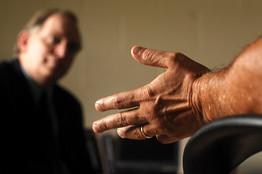(See “everybody should own at least one” update at the end of the post)
On Saturday April 28, Jonathan Merritt tweeted a link to a blog with an 18 year old audio of former Southern Baptist Convention president Paige Patterson advising women not to divorce abusive husbands.
After a social media explosion, Patterson issued a response on Sunday on the website of the seminary he leads, Southwestern Baptist Theological Seminary. The comments were made in March 2000 at a Southern Baptist Convention conference (co-sponsored by the Council for Biblical Manhood and Womanhood) and had been posted several times over the years on various blogs and websites. Over the years, several writers (including me) have asked Patterson if these views are his current views. Now, 18 years later, he has responded and the outrage is growing.
Black Eyes
Here is what he said in the audio after he is addressed by an unknown questioner (click the link to listen).
It depends on the level of abuse to some degree. I have never in my ministry counseled that anybody seek a divorce, and I do think that’s always wrong counsel. There have been, however, an occasion or two when the level of the abuse was serious enough, dangerous enough, immoral enough that I have counseled temporary separation and the seeking of help. I would urge you to understand that that should happen only in the most serious of cases. I would cite examples of it but the examples that I have had in my ministry are so awful that I will not cite them in public. That’s enough to say however, that there’s a severe physical and/or moral danger that’s involved before you come to that. More often, when you face abuse, it is of a less serious variety but all abuse is serious.
There are two or three things that I say to women who are in those kinds of situations. First of all, I say to them that you must not forget the power of prayer. Just as one of your little children comes to you with a broken heart and crawls up into your arms and looks into your face and with tears running down his cheeks asks you to intervene in a situation. If you have anything in you of a loving parent’s heart at all that’ll bring you to your attention and you’re off and running. And now if you then being evil know how to give good gifts to your children how much more shall your Father in heaven do good if you ask of Him. Do not forget the power of consecrated concentrated prayer. Get on your face and ask him to intervene and He is a good and a dear heavenly Father at some point He will intervene. I give one brief example of it.
I had a woman who was in a church that I served, and she was being subject to some abuse, and I told her, I said, “All right, what I want you to do is, every evening I want you to get down by your bed just as he goes to sleep, get down by the bed, and when you think he’s just about asleep, you just pray and ask God to intervene, not out loud, quietly,” but I said, “You just pray there.” And I said, “Get ready because he may get a little more violent, you know, when he discovers this.” And sure enough, he did. She came to church one morning with both eyes black. And she was angry at me and at God and the world, for that matter. And she said, “I hope you’re happy.” And I said, “Yes ma’am, I am.” And I said, “I’m sorry about that, but I’m very happy.”
And what she didn’t know when we sat down in church that morning was that her husband had come in and was standing at the back, first time he ever came. And when I gave the invitation that morning, he was the first one down to the front. And his heart was broken, he said, “My wife’s praying for me, and I can’t believe what I did to her.” And he said, “Do you think God can forgive somebody like me?” And he’s a great husband today. And it all came about because she sought God on a regular basis. And remember, when nobody else can help, God can.
And in the meantime, you have to do what you can at home to be submissive in every way that you can and to elevate him. Obviously, if he’s doing that kind of thing he’s got some very deep spiritual problems in his life and you have to pray that God brings into the intersection of his life those people and those events that need to come into his life to arrest him and bring him to his knees.
In his statement on Sunday, Patterson wrote about that woman with the black eyes:
Many years ago in West Texas, a woman approached me about the desire of her husband to prevent her attendance in church. He was neither harsh nor physical with her, but she felt abused. I suggested to her that she kneel by the bed at night and pray for him. Because he might hear her prayer, I warned her that he could become angry over this and seek to retaliate. Subsequently, on a Sunday morning, she arrived at church with some evidence of physical abuse. She was very surprised that this had happened. But I had seen her husband come into the church and sit down at the back. I knew that God had changed this man’s heart. What he had done to his wife had brought conviction to his heart. I was happy—not that she had suffered from his anger, but that God had used her to move her husband to conviction of his sin. I knew that she was going to be happy for him also. That morning, he did make his decision for Christ public before the church, and she was ecstatic. They lived happily together from that time on in commitment to Christ. There was no further abuse. In fact, their love for one another and commitment to their home was evident to all. She herself often shared this testimony. For sharing this illustration, especially in the climate of this culture, I was probably unwise. However, my suggestion was never that women should stay in the midst of abuse, hoping their husbands would eventually come to Christ. Rather, I was making the application that God often uses difficult things that happen to us to produce ultimate good. And I will preach that truth until I die.
Turning from Bad Advice
I once recommended sexual orientation change efforts. I don’t now. I actively denounce them now. I don’t pretend that I always opposed them. I regret my former advice and I have written many lines since about 2006 to turn from that bad advice.
regret my former advice and I have written many lines since about 2006 to turn from that bad advice.
Rev. Patterson in his Sunday statement wrote, “my suggestion was never that women should stay in the midst of abuse, hoping their husbands would eventually come to Christ.” As Jacob Denhollander first pointed out on Twitter, that’s not exactly correct. Denhollander said:
No, Mr. Patterson, that’s not true. That’s exactly what you did.
Patterson even warned the woman that her husband “may get a little more violent” before he sent her back into an abusive situation with the advice to pray for him.
If Patterson truly believes women should leave abusive situations then he should decisively turn from his prior position. It isn’t just poor politics to share such stories in “the climate of this culture.” Even if this one story is true (and I would like to hear from that couple), that doesn’t make the advice generally correct or wise.
Patterson says he agrees with the Council for Biblical Manhood and Womanhood statement on abuse. If that is true, that is a good thing. He would also do well to recognize that his advice in 2000 and that statement now are incompatible.
Additional information: “I think everybody should own at least one.”
In reading more about Rev. Patterson’s views on women in ministry, I came across a quote that I wanted to check out. See below for the quote about “owning at least one woman.”
According to the May 4, 1997 edition of the Atlanta Journal-Constitution, embattled seminary president Paige Patterson answered a question about ordaining women with the following quip:
“I think everybody should own at least one,” Patterson quipped when asked about women.
The article isn’t in digital format (except here) but has been referred to by several bloggers over the years. I looked it up in a newspaper database. Sure enough there it is.
The article was in response to plans by moderate Southern Baptists to start new seminaries in the wake of the conservative take over of convention seminaries. One of the hopes of the moderates was to ordain women. Patterson didn’t agree and expressed himself with what the reporter took to be a joke.
 Ministries canceled a conference in CA because they contend the bill (when it becomes law) will forbid advice which doesn’t affirm homosexuality. According to the
Ministries canceled a conference in CA because they contend the bill (when it becomes law) will forbid advice which doesn’t affirm homosexuality. According to the 
 regret my former advice and I have written many lines since about 2006 to turn from that bad advice.
regret my former advice and I have written many lines since about 2006 to turn from that bad advice.